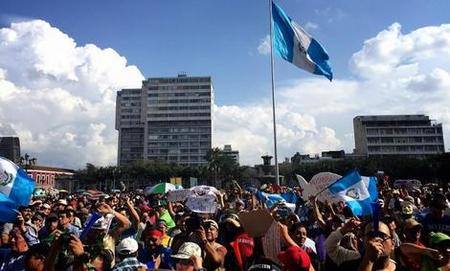
Guatemala is a country on the brink. At one point, some considered the country to be on the brink of being a failed state. In recent years, Guatemala has made headlines with bleak statistics illustrating the range of challenges it faces: the country suffers from the fifth highest homicide rate in the world, drug trafficking and narco money have penetrated society, child malnutrition is the worst in the hemisphere, and the state institutions responsible for providing services to Guatemalan citizens are notoriously weak and corrupt. Although those challenges still exist, Guatemala is now stepping back from the brink toward a much brighter future, brought about by citizens demanding more from their elected leaders.
It began on April 16 when the United Nations-backed International Commission Against Impunity in Guatemala (CICIG) and the Guatemalan Attorney General’s Office (Ministerio Publico) uncovered a massive corruption scheme that involved high-level government officials. The criminal network, known as La Linea (after the hotline used in the scheme), involved public officials charging importers bribes in exchange for lower import taxes, defrauding the country an estimated $120 million in tax revenue. The Ministerio Publico arrested 22 people in connection with the scheme. This is only one of the major corruption scandals uncovered by CICIG and Ministerio Publico in recent months.
Although both President Otto Perez Molina and Vice President Roxana Baldetti denied their involvement, top officials and cabinet members began resigning in protest, including the candidate for president from their own party. Baldetti, the first female vice president, resigned on May 8 in response to peaceful protests. She was arrested and indicted shortly thereafter and is currently awaiting trial in prison. Alejandro Maldonado was selected by Congress and sworn-in as her successor.
The protest movement gathered steam throughout the summer, with thousands of Guatemalans continuing to gather peacefully every Saturday in the Central Plaza in Guatemala City and other cities throughout country, united in their call for Perez Molina’s resignation and demanding accountability, an end to corruption and impunity, and reforms to the laws that govern elections and political parties.